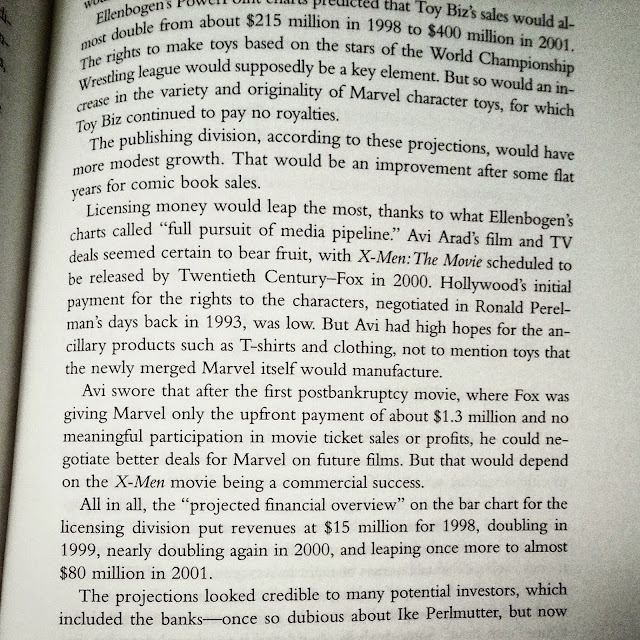Or perhaps there's gonna be a Crisis...
"The blog I always wanted to read." - Joseph Adorno, Creator & Author of Comic Book Rehab
Thursday, August 14, 2014
The Magrs Method of Book Reporting: "Comic Wars: How Two Tycoons Battled Over The Marvel Comics Empire - And Both Lost" by Dan Raviv
Or perhaps there's gonna be a Crisis...
Wednesday, August 6, 2014
A Summer of Sherlock: "Sherlock Holmes: The Titanic Tragedy" by William Seil
Encapsulate the plot in one sentence?
Aiming to carry out a secret mission in America, Sherlock Holmes and Doctor Watson unwittingly board the Titanic on it's sole voyage in 1912.
When was this published?
1996. The edition I'm reviewing is the 2012 reprint by Titan Books, as part of The Further Adventures of Sherlock Holmes series of original "pastiche" novels.
What's your verdict?
The novel is set before the World War One adventure His Last Bow. It features a Sherlock Holmes and Doctor Watson who are in their 60s, aware of their celebrity status and entering the twentieth century. In other words, this book is a lot like the Sherlock Holmes films starring Basil Rathbone and Nigel Bruce ( although the Watson in this book was definitely Edward Hardwicke from the 80s series with Jeremy Brett ). In fact, I could imagine a film of this made in the early 60s, with Rathbone as Sherlock, John Williams ( replacing Nigel Bruce, who passed away the decade before ) as Watson, David Niven as Colonel James Moriarty, Paula Prentiss as Christine Norton, Pamela Tiffin as Holly Storm-Fleming...and Peter Sellers as Jacques Futrelle. Directed by Clive Donner. Of those names, Tiffin as Fleming popped into my head whenever I read her dialogue; she's the most-interesting of the characters Seil created for this story. And while Futrelle in real life looked more like the DNA hybrid clone of Peter Lorre & Paul Sorvino than Peter Sellers, I could just imagine the sight of Sellers wearing pince-nez glasses and mangling an American accent portraying the one-hit-wonder mystery writer who went down with the ship.
The plot? Stolen submarine plans...daughter of Irene Adler teams up with Holmes and Watson...dizzy groupie ( Holly Storm-Fleming ) is carrying a secret...Professor Moriarty's brother is onboard...actually, this "Holmes on a boat" stuff reminded me of Pursuit To Algiers, one of the Sherlock Holmes films starring Rathbone and Bruce, only this time, the ship is the TITANIC, which is featured here like an exotic location that enhances things. There's little real Sherlockian detection on display, though he does spend most of the book disguised as a veteran seaman, so Holmes penchant for disguises is fully displayed.
And then there's that boat...this book was published just one year before James Cameron's film about the ship took over the pop culture consciousness, so, yes, it is tempting to imagine this book and that film as Rosencrantz and Guildestern Are Dead -esque scenarios, with Holmes wrestling Moriarty on one area of the sinking ship while Jack & Rose are running from Billy Zane on the other, combined with Jacques Futrelle enjoying a conversation with John Jacob Astor while his wife May looks on from the departing lifeboat ( that does not occur in the book, but it is May Futrelle's real-life account of the last moments she saw her husband before he went down with the ship)..the final quarter is the real highlight/draw of the book- an account of the sinking and evacuation of the ship from Watson's point of view - and it's well done. It's actually more convincing than the Cameron film because Seil manages to avoid turning it into an action/disaster film, which is what the movie tried and failed to avoid becoming, because those sequences contrast too sharply with the rest of the picture.
Which scenes in the book will stay with you?
Oddly, there's a scene were Seil has Futrelle recap The Problem of Cell 13, the story he is best-known for...it's actually very silly, but it was considered a rival to Doyle's detective stories at the time. Then there's every scene with Holly. She was a terrific character that got the book moving whenever she turned up. Definitely Pamela Tiffin.
Will you be keeping this book?
Yes. While I do wish the more fanciful characters (Moriarty and Christine) had been more interesting...and the detective work was not as marginal as it was...it was still interesting and had a good ending.
Give us a good quote.
Of course. Check out the gallery below.
***
That completes the "Summer of Sherlock". I hoped you enjoyed the books I chose - or at least enjoyed my reviews of them! I might do this again next Summer - if not with Sherlock Holmes books, then perhaps a different character, one with a series that I can pick and choose entries from. James Bond novels? Jack Ryan novels? Star Wars novels? So-called "Young Adult Dystopian" fiction? Eh...that last selection would be an act of courage...I would want to get paid for that.
























